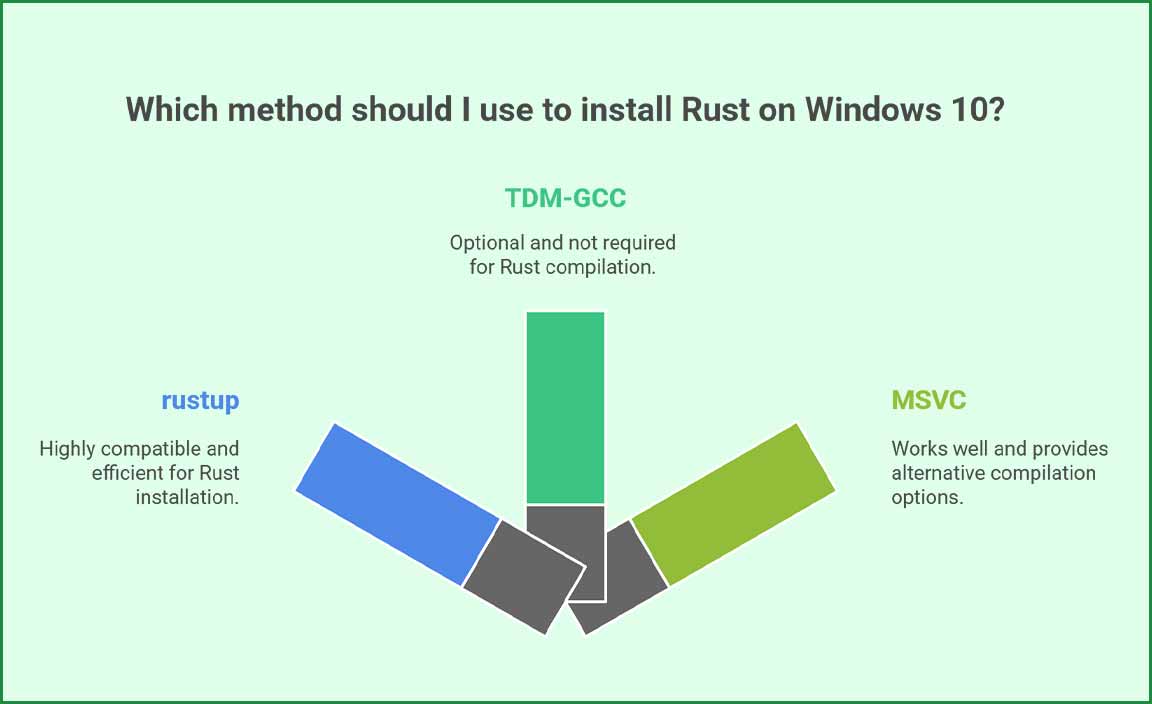Have you ever wondered how to run Rust smoothly on Windows 10? You’re not alone. Many new programmers ask if they need tdm-gcc for Rust on this platform. Imagine trying to bake a cake without all the right ingredients. It just doesn’t work that well.
Tdm-gcc acts like a helpful friend. It provides tools to make Rust play nice with Windows. But do you really need it? Some say yes; others think it’s not necessary. It’s a hot topic among developers.
Here’s a fun fact: Rust is known for its speed and safety. But navigating its setup can be tricky, especially on Windows 10. This is where tools like tdm-gcc come into play. They can simplify your coding journey.
So, what is the truth? Do you need tdm-gcc for your Rust adventure? Let’s explore this question together and find out the best path for you.

Is Tdm-Gcc Need For Rust On Windows 10? Exploring The Essentials
Using Rust on Windows 10 can be tricky. Many developers wonder if TDM-GCC is needed. The good news is TDM-GCC is not always required. Rust has its own tools that often work better. TDM-GCC is a C and C++ compiler. It can help with certain tasks but isn’t essential. Imagine trying to put together a puzzle. Sometimes, you need extra pieces, and other times, you can finish it on your own. Rust provides a complete set of tools, making development easier without TDM-GCC.

Understanding TDM-GCC
Definition and purpose of TDMGCC. Comparison with other GCC distributions.
TDM-GCC is a special version of the GNU Compiler Collection meant for Windows. It helps programmers write and run code easily, especially in C and C++. Think of it like a handy toolbox where all your favorite tools are organized and easy to find!
Compared to other GCC versions, TDM-GCC is like that cool kid who brings snacks to a party. It’s specifically designed for Windows, so it plays nicely with the system. Some other versions might not work as well on Windows, causing headaches for developers. TDM-GCC gets the job done without fuss!
| Feature | TDM-GCC | Other GCC Versions |
|---|---|---|
| Compatibility | Excellent for Windows | May have issues |
| User-Friendliness | Very user-friendly | Can be tricky |
| Extra Tools | Comes packed with extras! | Depends on the version |
In short, whether you’re a beginner or an expert coder, TDM-GCC makes coding on Windows fun and much simpler!
Is TDM-GCC Required for Rust on Windows 10?
Analysis of Rust’s compatibility with TDMGCC. Alternative options for installing Rust on Windows 10.

Many wonder if TDM-GCC is vital for using Rust on Windows 10. The good news? It isn’t a must-have! Rust plays nice with various compilers. You can effortlessly install Rust through rustup, which is simple and efficient. Other options like MSVC also work well. No need to stress about TDM-GCC unless you love it like a loyal pet. The reality is you can easily compile Rust programs without it.
| Installation Option | Compatibility with Rust |
|---|---|
| rustup | Highly Compatible |
| TDM-GCC | Optional |
| MSVC | Works Well |
Installation Process of Rust on Windows 10

Stepbystep guide for installing Rust. Tools and dependencies required.
Ready to dive into Rust? Let’s get you set up on Windows 10! First, check if you have the right tools. You’ll need a command line interface and some software. Don’t worry, it’s easier than making a sandwich! Follow this simple guide:
| Step | Action |
|---|---|
| 1 | Open your command prompt. |
| 2 | Run the installer by typing rustup-init.exe. |
| 3 | Follow the on-screen instructions. |
| 4 | Check your Rust version with rustc –version. |
And voilà! You’re ready to rustle up some code. Happy coding!
Community Insights and Experiences
User reviews and experiences regarding TDMGCC and Rust. Common challenges faced by developers.
Many users have shared their experiences with TDM-GCC and Rust. Overall, developers find it helpful but also face challenges. Some common issues include:
- Installation difficulty on Windows 10.
- Configuration problems with Rust.
- Compatibility issues with certain libraries.
Despite these hurdles, many developers praise TDM-GCC for its reliability and performance. They appreciate how TDM-GCC works well with Rust, making coding fun and productive.
What do users think about TDM-GCC and Rust?
Users often report that TDM-GCC helps them compile Rust projects smoothly. However, they also mention the need for clear setup guides to avoid confusion.
Best Practices for Using Rust on Windows 10

Tips for optimizing Rust development environment. Recommended tools and IDEs for Windows 10 users.
To make Rust development smooth on Windows 10, follow these best practices. Start with installing the Rust toolchain. This setup is easy and helps you manage Rust versions. Use IDEs like Visual Studio Code for better code support and debugging. Also, check these recommended tools:
- Rust Language Server (RLS) for helpful code suggestions.
- Cargo for managing your Rust projects easily.
- Clippy for linting your code to improve quality.
These tips will help you code effectively and enjoy Rust programming!
What tools should I use for Rust on Windows 10?
Use Visual Studio Code, Rust Language Server, Cargo, and Clippy for the best Rust experience.
Conclusion
In summary, TDM-GCC is not strictly needed for Rust on Windows 10. Rust has its own tools to work smoothly. You can easily set up Rust using its installer. If you’re curious, explore the Rust documentation for more details. Start coding today and enjoy creating with Rust!
FAQs
Certainly! Here Are Five Related Questions On The Topic Of Whether Tdm-Gcc Is Needed For Rust Development On Windows 10:
You don’t really need TDM-GCC for Rust development on Windows 10. Rust comes with everything you need when you install it. It has its own tools to help you write and run your programs. If you want to use TDM-GCC, that’s okay, but it’s not necessary for Rust. Just follow the steps to set up Rust, and you’ll be good to go!
Sure! Please ask your question so I can help you with it.
What Is Tdm-Gcc, And How Does It Relate To The Rust Programming Language On Windows 10?
TDM-GCC is a tool that helps us use the Rust programming language on Windows 10. It works like a helper that turns our code into programs we can run. When we write in Rust, we need TDM-GCC to make everything work together nicely. So, if you want to create cool things with Rust on your Windows computer, TDM-GCC is really helpful!
Are There Alternative Toolchains Or Compilers For Rust Development On Windows That Do Not Require Tdm-Gcc?
Yes, there are other options to build Rust programs on Windows without using TDM-GCC. You can use MSVC, which stands for Microsoft Visual C++. This toolchain is easy to install and works well with Rust. You can also try MinGW-w64, which is another compiler for Windows. We can pick any of these alternatives to develop Rust programs!
What Are The Advantages And Disadvantages Of Using Tdm-Gcc For Rust Development Compared To Other Setups On Windows 10?
Using TDM-GCC for Rust development on Windows 10 has some good and bad points. One good thing is that TDM-GCC is easy to install and use. It helps you build your Rust projects quickly. However, it might not have all the latest tools and features that other setups offer. Sometimes, this can make it harder to solve problems or get new updates.
How Can I Install And Configure Tdm-Gcc Alongside Rust On A Windows Machine If I Choose To Use It?
To install TDM-GCC on your Windows computer, visit the TDM-GCC website and download the installer. Run the installer by double-clicking it, and follow the steps to finish installation. Next, you need to install Rust. Go to the Rust website and click “Get Started” to download the installer for Rust too. After installing both, you should set up your environment. This means telling your computer where to find TDM-GCC and Rust. You can do this by adding their paths to your system settings. Now you can use both TDM-GCC and Rust to write your code!
Does Using Tdm-Gcc Impact The Performance Or Compatibility Of Rust Applications On Windows 10?
Using TDM-GCC can change how Rust applications work on Windows 10. It might make some programs run slower or have problems. But many people find that their Rust apps work just fine. If you try it, test your apps to see how they perform.
Resource:
-
Learn more about Rust’s tools and installation options: https://www.rust-lang.org/learn
-
Recommended IDE for Rust development on Windows: https://code.visualstudio.com/
-
Understand GCC compilers and how they work on Windows: https://gcc.gnu.org/
-
Alternative Windows compiler toolchain to consider: http://mingw-w64.org/doku.php
